Big Read: Amid Singapore's brutal F&B scene, some businesses find success overseas
Local operators said Singapore may be a brutal market, but it is still the best proving ground for those looking to build a successful business in the food and beverage industry.
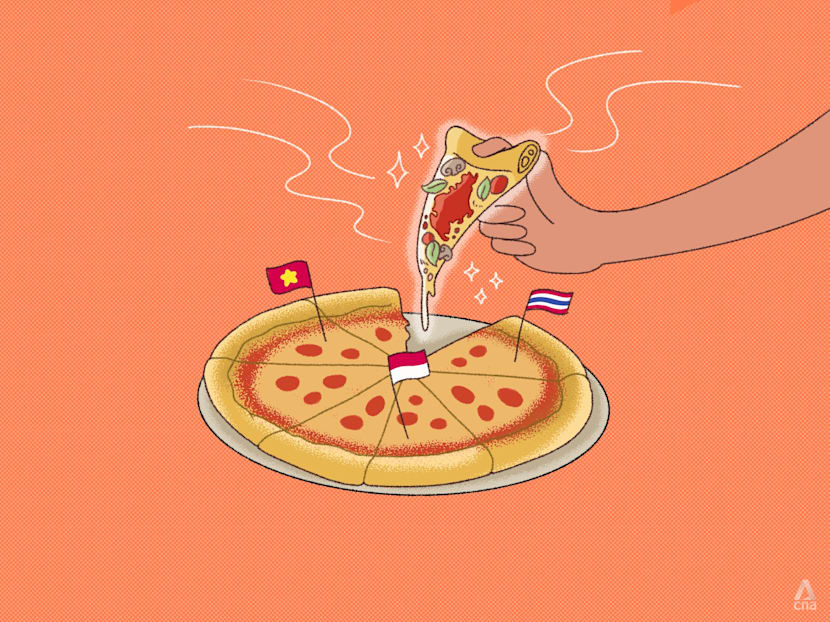
Experts and F&B operators say expanding abroad has become necessary amid Singapore's increasingly challenging operating conditions, which have forced a wave of closures. (Illustration: CNA/Nurjannah Suhaimi)

This audio is generated by an AI tool.
When Sarnies first opened on Telok Ayer Street in 2011, Singapore's cafe scene was just starting to bloom.
More multinational companies and financial heavyweights were expanding or setting up their Asian headquarters in the financial hub, recruiting top talent from around the world to work out of Singapore's Central Business District (CBD), and these suits needed fuel in the form of lattes, macchiatos and cappuccinos.
Soon enough, brunch became a trendy affair and the hip, independent cafes in the CBD became hotspots even on weekends, especially as certain areas, such as Club Street, were pedestrianised.
“It was a sea of people,” Sarnies co-founder Benjamin Lee recalled of those heydays.
But those days were short-lived. Within just two to three years, Mr Lee said it started becoming more challenging to run the business. As margins thinned, customers became more price sensitive, culminating in higher operating costs due to rental hikes and tightening labour restrictions
By 2015, the team knew they had to look beyond Singapore. Mr Lee and his co-founder Eric Chan made exploratory trips to Manila and Malaysia, but the markets just “didn’t feel right”.
Eventually, they found their second home in Bangkok. A consulting project in 2016 brought the team to the Thai capital, which reminded them of the buzz of those early days in Singapore – it was a city with plenty of good coffee shops, but none offering an all-day brunch concept like Sarnies.
And so, the team started with a small coffee bar, located in a temporary shipping container in Bangkok, that same year. After 18 months of immersing themselves in the Bangkok market, they moved into a spot in a heritage building in the city's old town to start their fully fledged brunch cafe.
Today, Sarnies has two outlets in its home base of Singapore, but eight across Bangkok, each one tailored to the neighbourhood in which it is located.
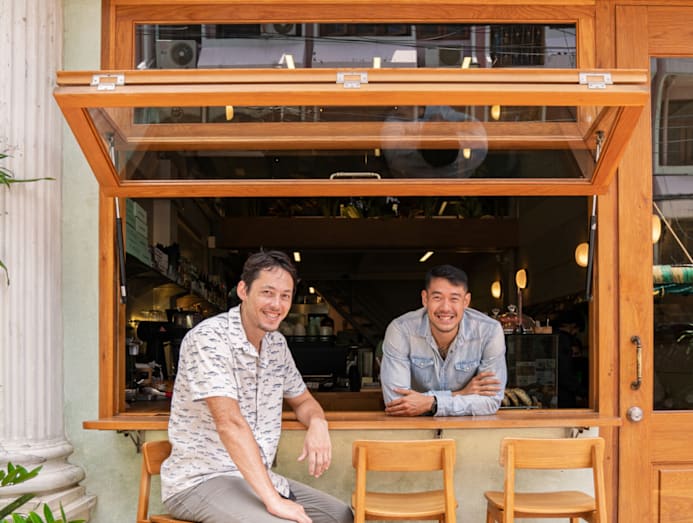
Beyond its cafés, the Sarnies group has spun off a cocktail bar called F*nkytown, a Latin American restaurant called Caritos and a salad brand called Pimp My Salad, all in Bangkok too.
It may sound like a smooth-sailing journey to success, but it was hard work: Before gaining traction in Bangkok, Sarnies' Mr Lee and Mr Chan said they had to make several changes to their menu to suit the more diverse customer profile there.
"The Thais prefer something a bit more interesting … If we were to take the Sarnies in Telok Ayer and plonk it somewhere in Bangkok right now, it probably won't be received as well," said Mr Chan.
This is because the Telok Ayer outlet primarily caters to Singapore's office crowd, while the various Sarnies outlets in Bangkok attract a more diverse mix, including locals, returnees who have studied overseas, expatriate digital nomads and tourists seeking hearty brunch-style fare.
Their experience underscores a broader lesson for Singapore's food and beverage (F&B) brands: Internationalisation is key to growth, but each new market comes with its own quirks, and the fit between concept and city can make or break the venture.
Experts who spoke with CNA TODAY noted that a common pitfall F&B businesses face when expanding abroad is underestimating the differences in each market's local tastes.
Dr Samer Elhajjar, a senior lecturer of marketing at the National University of Singapore (NUS) Business School, said: "Even within Southeast Asia, preferences for spice levels, portion sizes and pricing vary widely. Brands that fail to adapt often struggle."
Difficult as it is, experts and F&B operators said expanding abroad has become necessary amid Singapore's increasingly challenging operating conditions, which have forced a wave of closures.
Among those that have grabbed headlines recently: On Sept 28, Ka-Soh, the 86-year-old Cantonese "zi char" institution, shuttered its doors. In July alone, 320 outlets went under, including family-run Burp Kitchen & Bar, which had been operating since 2014. And on Aug 31, the Prive Group pulled the plug on all its 10 restaurants, in a month that saw 360 closures.
Last year, more than 3,000 F&B businesses shut down, an average of 250 a month, marking the highest level of attrition in nearly two decades.
The slew of closures has sparked concern and plenty of debate among Singaporeans, especially as they have also hit some well-established and long-running businesses.
Still, many new entrants persist in trying their luck in this tough market: According to figures from the Accounting and Corporate Regulatory Authority (ACRA), 3,102 new food businesses have started up so far this year, even as 2,286 have shuttered.
SINGAPORE: TOUGH BUT REWARDING
F&B veterans say the plucky entrepreneurs setting up shop in Singapore today face an uphill battle, but it will also be a good test of their offerings: Singapore's fiercely competitive scene is what makes it a superb training ground for new businesses.
As Sarnies' Mr Lee said: "It's worth noting that our success in Thailand wouldn't have been as good as it has been if it weren't for Singapore. Singapore is where we cut our teeth and where we learnt how to do business.
"Singapore is a challenging market, but if you can make it work in Singapore, you have a good shot at making it work in other places."
Sharing his sentiments, chef-owner of pizza parlour Artichoke, Bjorn Shen said Singapore's diners have a thirst for interesting and creative dining experiences, making it an invigorating market to operate in.
"If you've got a good product, if you've got talent, Singapore is a more discerning audience that can soak up this product and receive it well," said Mr Shen.
"If you've got creativity and talent, Singapore is still the best place."
Apart from Artichoke, Mr Shen runs a seven-seater pizza omakase restaurant called Small's in Singapore. Outside his home base, Mr Shen owns a wine bar named NEP! in Penang, Malaysia. He also operated a pizzeria called Baba G's Pizza in Bali, Indonesia, which he recently closed.
Similarly, snack brand IRVINS, best known for its salted egg chips and fish skin, also sees Singapore as its proving ground.
"It's always key to have something proven in the home market," said Mr Reno Chow, the senior vice president of the commercial arm of IRVINS.
"We treat Singapore as our innovation home – we test different products, flavours, formats and collaborations here before scaling them overseas," said Mr Chow.
That said, the business owners all agree that Singapore can be a punishing market to be in.
Razor-thin margins and high operating costs make it extremely difficult for the restaurant business, Mr Shen said, calling it a "bloodbath".
Even if you're (running a full house), you can still be losing money. Because the truth is that overheads in Singapore to keep the business running are very, very high.
"Even if you're (running a full house), you can still be losing money. Because the truth is that overheads in Singapore to keep the business running are very, very high," he said.
It's such conditions that have nudged many F&B operators to look elsewhere just to keep their business going.
Mr Douglas Ng, a co-founder of the restaurant chain Little Red Dot in Indonesia, said that after a decade in Singapore's F&B scene, from running a hawker stall to managing a food chain and franchise, he found the market was becoming increasingly competitive, especially in terms of manpower.
"You want to expand, but you don't have enough people to work for you. So it's very demanding in terms of manpower," said Mr Ng.
In 2020, his hawker stall, Fishball Story, was acquired by a larger F&B company. Then in 2024, he set up shop in Indonesia with F&B group GF Culinary, where he now runs six Little Red Dot outlets serving Singaporean cuisine.
He also operates a Tuan Yuan fish head hotpot outlet in Indonesia with GF Culinary.
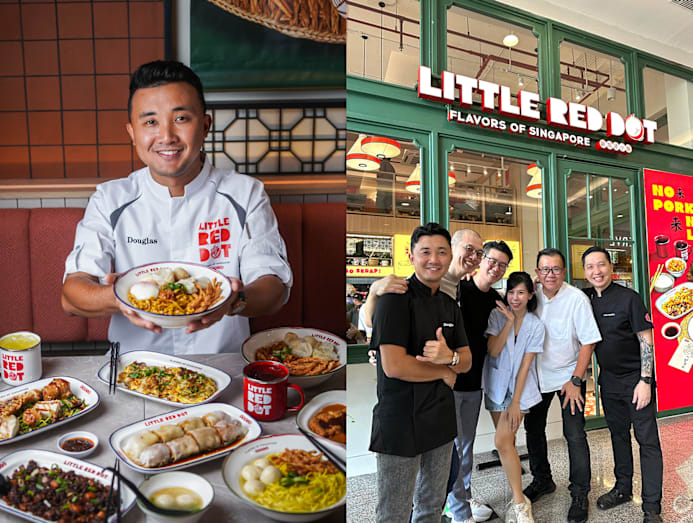
In Indonesia, Mr Ng said he has found it much easier to hire staff and keep costs under control, and fresh ingredients are more affordable.
Indeed, because of the high costs in Singapore, founder of The Ice Cream & Cookie Co, Ms Natasha Chiam, said that there is very little room for error.
Despite high operating costs, companies still have to price their products competitively, and so margins may be thin, she noted.
"With thin margins, you have less buffer to absorb shocks or unexpected costs, such as big spikes in ingredient prices like we've seen with cocoa and pistachio prices recently," she added.
"The conditions are so tight that you don't have much room to fail and learn – failure here might just be your failure, full stop."
The Ice Cream & Cookie Co manufactures ice cream sandwiches, pints and novelties, supplying to major supermarkets in Singapore such as NTUC FairPrice and Cold Storage, as well as export markets including Hong Kong, Malaysia and Taiwan.

When looking to open its first brick-and-mortar outlet, the firm chose Hong Kong, a market with a similar purchasing power to Singapore and consumers who are curious and receptive to new flavours.
At the same time, rentals in the the city had corrected more sharply, making it a relatively more affordable entry point.
Aside from high operating costs, Singapore's tiny size adds another layer of difficulty.
Even with the burgeoning number of tourists visiting the Republic, the F&B sector is approaching saturation point, with more businesses opening than closing each year, said Associate Professor Lau Kong Cheen from the school of business at the Singapore University of Social Sciences (SUSS).
Amid these challenges, venturing abroad makes sense, as it would provide a diversification of risks and offer new revenue generation opportunities, he said.
For this reason, Enterprise Singapore (ESG) has supported local F&B companies in more than 700 overseas market exploration projects in the past three years, said its director of food services and heartland enterprises Mr Jason Lim.
ESG is a government agency that helps local companies grow, innovate and expand internationally while also promoting Singapore as a trusted global trading hub.
Mr Lim said Southeast Asia is a primary region for expansion due to its proximity, larger consumer base and growing middle class.
He pointed to Indonesia and the Philippines as key growth markets, with Indonesia’s food services sector worth over US$55 billion in 2024 and projected to nearly double by 2029. The Philippines’ market, valued at over US$16 billion, is expected to surpass US$31 billion in the same period.
Associate Professor Ramanathan Vythilingam of Nanyang Business School at the Nanyang Technological University added that outside of Singapore, "markets in Southeast Asia will offer benefits like a lower cost of operations, readily available local talent and locally sourced ingredients that can make the cost model more affordable".
Overseas expansion can also be a way for Singapore brands to try out new ideas in a less challenging market, he said. If successful, they can then introduce them to Singapore.
OVERSEAS MOVE NOT A GUARANTEED SUCCESS
Still, success is not always assured when a business goes abroad.
Mr Shen has seen this firsthand. He opened a pizzeria in Seminyak, Bali last year, encouraged by industry friends and fellow restaurateurs who told him the market promised high margins and quick returns. But the reality was starkly different.
From day one, we were losing money. We never made back a single cent of our investment.
"From day one, we were losing money," he said. "We never made back a single cent of our investment."
Through that venture, Mr Shen said he lost S$15,000 every month in the last 13 months.
He has learnt a lot about the specific nature of Bali's customer base as a result, and how it differs from Singapore's. Bali's restaurant trade is driven by a transient crowd, such as tourists, domestic visitors from Jakarta and Surabaya and digital nomads, he noted.
"What happened with Bali is that the people coming through are not spending. The type of expat that lives in Bali is not the same kind of expat that lives in Singapore," said Mr Shen.
He said the Bali consumer tends to be more frugal, splurging on select amenities such as gym memberships while saving on food.
Mr Shen also found that diners in Bali did not have the appetite for more inventive dishes.
"We have all sorts of interesting pizzas, but our bestsellers were still margherita and pepperoni," he said.
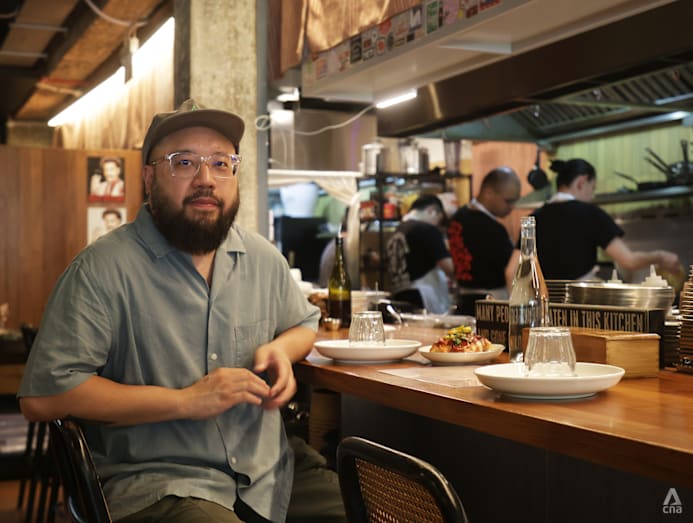
In contrast, his first overseas project in Penang is doing much better, an outcome he attributes to his partners, who are both long-time employees based there.
Crucially, Mr Shen said Penang has a good location, with cruise ships passing through and bringing in a mix of tourists and locals who are more willing to try new things.
"I feel like we naturally attract a certain crowd there that is either already a bit more adventurous or willing to subject themselves to something new," said Mr Shen.
Even though his Bali experiment did not work out, he said that outlet and the one in Penang still cost less than his Singapore's operations.
"For the cost of opening one restaurant in Singapore, I can open nine restaurants in Malaysia," he said, noting that his rent for Singapore was between 10 to 15 times more than his rent in Penang.
An exhaust system he put in Artichoke cost him S$50,000 (US$38,757), but a similar system he had installed at NEP! in Penang only cost him S$3,000.
Similarly, the Sarnies co-founders discovered that Bangkok offered structural advantages over Singapore. For example, in Bangkok they can secure long leases on shophouses of up to 15 years, providing a stability unheard of in Singapore.
"You're much more secure raising that money and putting that money in," said Mr Lee, knowing that rent is going to be maintained at the same level for 15 years.
In Singapore, meanwhile, "there's always that risk that, at the end of three years, you might get your rent doubled, and that's your business done," he said.
The lower cost of labour in Thailand has also given Sarnies the freedom to take more risks and experiment with new concepts, he said.
In Singapore, the difficulty of finding manpower makes it hard for them to attempt anything complicated. If a key staff member were to leave, there might be no one with the expertise to execute the concept correctly.
In Bangkok, however, outlets can afford to be slightly overstaffed and staff are cross-trained, giving businesses far more cushion for error and experimentation, Mr Lee said.
As such, the riverside branch of Sarnies caters to tourists, while in the Phrom Phong district, where a large Japanese community resides, the menu features heavy Japanese influences.
"If you go to one Sarnies, it doesn't mean you've gone to all of them," Mr Chan said of his Bangkok operations.
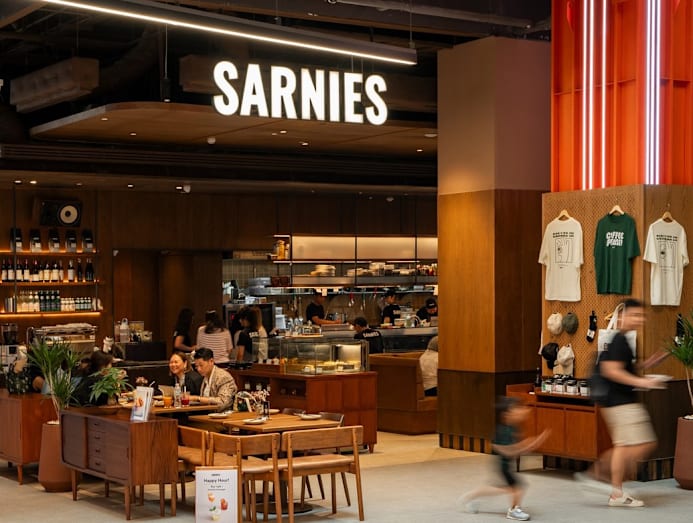
When it comes to adapting the menu for a new market, F&B owners said it is a balancing act of catering to local tastes while staying true to Singapore's roots.
For Little Red Dot in Indonesia, Mr Ng said localisation was a non-negotiable.
"Indonesians like their dishes a little more spicy and saltier compared to Singapore. We have to really adapt," he said. "We cannot be stubborn and insist everything has to taste like it does in Singapore."
It's a good trade-off for the ease of doing business there. Lower labour costs and the large population make it easier to recruit more staff to provide good customer service.
However, Mr Ng said customer demographics differ in Indonesia, where spending power may be lower than in Singapore.
"We had to really be careful in terms of pricing strategy. That's why we priced our bowls from more affordable meals to slightly more expensive ones that can cater to different markets," he said.
For Awfully Chocolate, its move abroad was less about survival and more about testing the brand's potential.
At that time, it was just a desire to test ourselves and the brand to see if we could stretch ourselves and go beyond our shores.
"At that time, it was just a desire to test ourselves and the brand to see if we could stretch ourselves and go beyond our shores," said founder Lyn Lee.
Awfully Chocolate, founded in 1998 in Katong, Singapore, is best known for its dark chocolate cakes and ice cream.
The dessert brand has 11 outlets in Singapore, four outlets in Guangzhou, China, where it ventured into in 2010, and one in Shenzhen, China.
Ms Lee said that she has found that Chinese customer preferences are slightly different from those of Singaporeans.
"In China, customers walk in and straight away ask which dessert is less sweet. So we adjust our products and range to suit (their tastes)," said Ms Lee.
Meanwhile, bakery chain BreadTalk found that expanding to overseas markets meant not only adapting to local tastes but also adjusting the space and services offered.
Ms Joyce Koh, group head of brand and communications at BreadTalk Group, said consumers in fast-paced Singapore are more accustomed to an efficient take-and-go bakery concept.
However, in some other markets, consumers may prefer to enjoy their baked goods in-store. As such, BreadTalk offers seating areas in its franchise outlets in Myanmar and Cambodia. At Toast Box Indonesia, it even offers table service.
Ms Koh added that to stay true to Singapore's origins, BreadTalk stores worldwide maintain about 80 per cent of the menu, allowing for 20 per cent of the menu to be made up of items created specifically for that local market. These include limited edition breads and pastries.
"This helps us connect authentically with customers in the various markets without losing our Singapore heritage," said Ms Koh.
The BreadTalk Group has close to 700 stores across its brand portfolio, including well-known brands such as Toast Box, Food Republic and Din Tai Fung in 14 markets. These include directly owned stores in China, Thailand and the United Kingdom, as well as franchises in China, Indonesia, the Philippines, Vietnam, Cambodia, Myanmar, Sri Lanka, India and Kuwait.
"Understanding these seemingly minor cultural differences and being flexible in our approach helps us to integrate more seamlessly into local communities," said Ms Koh.

THIS IS HOME, TRULY
Despite it all – the relentless pressures of high rentals, expensive manpower, a tight labour market and stiff competition – most of the F&B operators CNA TODAY spoke with said Singapore remains their anchor.
The Ice Cream & Cookie Co's Ms Chiam said Singapore remains the foundation of brand credibility, as the company's decade of community events and supermarket presence has made them a household name in the Republic.
"That presence here gives us the reputation we need when we enter export markets," she said.
Even with the strong performance of its brick-and-mortar store in Hong Kong, the company continues to keep Singapore as its hub where its manufacturing, research and development and supermarket distribution are based.
Mr Lee and Mr Chan of Sarnies agreed that while conditions are brutal in Singapore, if one can get F&B right in the Republic, it can be very rewarding.
"There are still a lot of good opportunities in Singapore," said Mr Chan, noting that while the scene is tough, it is "not entirely bleak".
He added that being a homegrown Singapore cafe brand carries weight overseas.
“We certainly received extra attention with our launch in Thailand by being a Singapore brand, and we think this will help us as we build more Sarnies partnerships in other countries," said Mr Chan.
Similarly, while Awfully Chocolate's Ms Lee has her sights set on further expanding in China, she said Singapore is core to the company's brand strategy.
"We will always be proudly Singaporean," she said. "We are determined to entrench ourselves as Singapore's chocolate brand."
She explained that overseas expansion for Awfully Chocolate is just one aspect of the company's overall strategy. Ultimately, the goal has always been to be Singapore's leading chocolate brand and then Asia's chocolate brand, she said.
Ms Koh of BreadTalk agreed, saying the company has always aimed to strike a balance between global reach and a strong local base.
"Singapore remains the heart and home of BreadTalk Group, while international expansion is vital for our long-term growth. It allows us to tap into larger markets and elevate our brand on a global stage," said Ms Koh.
Despite being "burnt" by his experience in Indonesia and grappling with tough times at home, Artichoke's Mr Shen said he remains hopeful about Singapore's food scene.
He said that one thing businesses can fall back on in Singapore is its tight-knit community, where word of mouth travels quickly.
"While costs are high and labour control measures are tight, there's still a silver lining. There's still a chance for you to succeed by targeting the right crowd and the well-established preferences of Singaporeans," he said.
"There is still some optimism to be had in Singapore," he said. "It's getting harder and harder, but it's not all doom and gloom."














